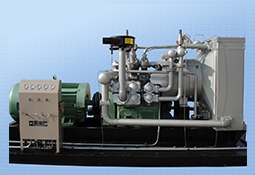Sales Department: 0552-3825188 0552-3825333
Accessories Department: 15955260712
Company Fax: 0552-3825255, 3825200
CNG Department: 13865028777 13865066118
After-sales service: 0552-3825155 0552-3825156
Company Address: No. 2581, Shuangdun Road, Huaishang District, Bengbu, Anhui Province
Company email: zdysj@126.com ahzdysj@126.com
What are the common faults of compressors?
What are the common faults of compressors? Let's take a look at it together:
1. The temperature is abnormal.
Abnormal exhaust temperature means higher than planned value. Theoretically, the factors affecting the increase of exhaust temperature are intake air temperature, pressure ratio and compression index (about air compression index K=1.4). The actual situation affects the high suction temperature factors, such as low intercooling power, and more scale deposits in the intercooler may affect heat transfer, so the suction temperature of the subsequent stage must be high, and the exhaust temperature will also be high. In addition, valve leakage and piston ring leakage not only affect the increase of exhaust temperature, but also change the pressure between stages. As long as the pressure ratio is higher than the normal value, the exhaust temperature will increase. In addition, for water-cooled machines, water shortage or lack of water will increase the exhaust temperature.
2. Abnormal pressure.
If the gas discharged by the compressor cannot meet the user's flow requirements under the rated pressure, the discharge pressure must be lowered. At this moment, we must change to a machine with the same exhaust pressure and large displacement. The main reason for the abnormal pressure between stages is the leakage after the valve or piston ring is worn. The reasons should be found from these aspects and measures should be taken.
3. Abnormal noise.
If some parts of the compressor malfunction, abnormal noises will be emitted. Generally speaking, the operator can distinguish abnormal noise. The gap between the piston and the cylinder head is too small, causing direct impact; the nut connecting the piston rod and the piston is loose or tripped; the end face of the piston is blocked, the piston moves upwards in series, and hits the cylinder head; the metal fragments falling into the cylinder and the accumulation in the cylinder Water will make a knocking sound in the cylinder. Crankshaft bushing bolts, nuts, connecting rod bolts, cross head bolts are loose, tripped, broken, etc. , The shaft diameter is severely worn, the gap is increased, the gap between the crosshead pin and the bushing is too large or the wear is serious. , All of these will make a crashing sound in the crankcase. The exhaust valve plate is broken, the valve tension spring is loose or damaged, and the load regulator is improperly adjusted. , All of these will make a knocking sound in the valve cavity. In order to find the fault and take measures.
4. Overheating failure.
When rubbing with the crosshead sliding plate, packing and piston rod, the temperature exceeding the specified value is called overheating. The result of overheating: One is to accelerate the wear between the friction pairs, and the other is to accumulate overheated heat energy and burn the friction surface, which poses a major trouble to the machine. The main reasons for bearing overheating are: uneven combination of bearing and journal or too small contact area; bearing deflection, crankshaft tortuous, low oil viscosity, oil circuit blockage, oil pump failure, and oil cut. When the device is not leveled, no gap is found, the main shaft and the motor shaft are not aligned, and the two shafts are tilted.

Related News
- How to adjust the air volume of the air compressor?
- The status quo and development trend of compressor technology
- Knowledge about daily maintenance of air compressors
- Reasons for lack of compressor displacement
- Maintenance of natural gas compressor
- Safe use of vinyl chloride compressors
- Analysis of several common failures of dimethyl ether compressor
- The structure and characteristics of vinyl chloride compressor
- How to maintain the vinyl chloride compressor?
- About the composition and price calculation of nitrogen compressor
- Precautions for pairing air compressors with dryers
- Analysis of the working principle of carbon monoxide
- Introduction to the working principle and characteristics of hydrogen compressor
- How to maintain the ammonia compressor?



